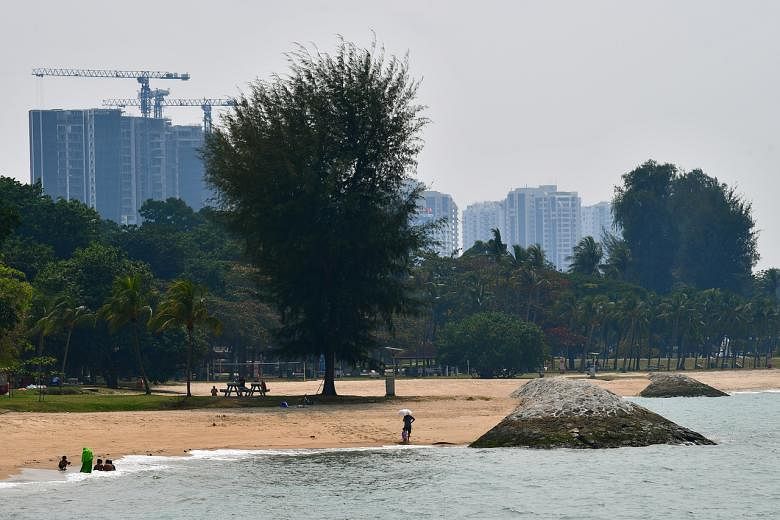SINGAPORE - National water agency PUB will take on an additional role as Singapore's national coastal protection agency to defend the country against climate change and sea levels rising.
In this new capacity, it will work with other government agencies and relevant parties to coordinate policies to help ensure better decisions on land use, development and activities to safeguard the coastline from flooding.
This was among several changes proposed in the Public Utilities (Amendment) Bill that was passed on Friday (March 6).
Minister for Environment and Water Resources (MEWR) Masagos Zulkifli said: "Climate change defence is existential for Singapore... Planning and investing long term for coastal defences and national flood protection will be critical to ensure that Singapore has adequate resources to meet this challenge."
To this end, the Bill also formalises the setting up of the Coastal and Flood Protection Fund, which was announced by Deputy Prime Minister Heng Swee Keat in his Budget speech.
The fund will be used to pay for the construction of physical barriers to keep sea water out, such as sea walls, dykes, tide gates or barrages, and outlet pumps to pump floodwaters out into the sea.
Singapore's vast network of inland drains will also be expanded and upgraded to cater to more intense and frequent rainfall, said Mr Masagos.
"These are all being studied, and may need to be deployed together to prevent flooding," he added.
To ensure that the measures are implemented in a fiscally sustainable manner, the fund will start with a $5 billion injection from Budget 2020, representing "our generation's contribution" towards the endeavour, he said.
Ms Lee Bee Wah (Nee Soon GRC) and Mr Gan Thiam Poh (Ang Mo Kio GRC), the two MPs who spoke during the debate on the Bill, had asked how the Government would ensure there will be enough funds.
Mr Masagos said the Government will be able to save up across successive terms and will top it up "whenever our fiscal situation allows".
Given the significant sums required for coastal protection, the Government will also use a combination of other funding tools, such as borrowing and use of past reserves for measures like land reclamation.
"We need to distribute the share of funding more equitably across current and future generations," he added.
To ensure accountability, PUB will publish how much of the fund is used in a separate section in its financial statements, among other things.
Another change to the law will give PUB greater oversight over desalination and Newater plants that PUB has worked with private sector companies to build and operate.
Currently, six out of 10 desalination and Newater plants are under this design-build-own-operate (DBOO) model.
While there are already contractual safeguards to ensure the security of Singapore's water supply, Mr Masagos said, the new legislative safeguards will bring the regulatory regime of these plants in line with those of other critical infrastructure such as electricity and telecommunications.
With the changes, the PUB will have greater oversight of the concession companies running these DBOO plants, or any underlying trusts or business trusts that may be set up to hold the plant assets.
First, someone can become a substantial controller or indirect controller of these companies only after they get approval from the PUB, he said.
"This will reduce the risk to Singapore's water security from having mega conglomerates monopolising our critical infrastructure but then unexpectedly collapsing," he added.
Second, the companies cannot be shut down voluntarily without PUB's consent, and the court will have to consider representations made by the PUB in any proceedings for these companies to be dissolved, terminated or wound up, he said.
Creditors of these companies also cannot enforce any court order against them without giving prior notice to PUB.
Third, in serious cases, the MEWR minister will be able to issue special administration orders directing that the affairs, business and property of such companies be taken over by another party, to ensure the continued operations of the DBOO plant, he said.
Ms Lee had asked if these legislative levers were triggered by the woes of distressed water treatment firm Hyflux, which applied in 2018 for court-supervised financial restructuring and defaulted on its debt payments.
The home-grown company had been saddled with a mountain of debt after it expanded into the energy business through the Tuaspring DBOO desalination plant, which has since been taken over by PUB.
Mr Masagos said the review on oversight over DBOO plants had started before the Hyflux saga, adding: "That said, the Hyflux situation was a reminder that we need to exercise proper oversight over our DBOO plants which are a key part of our water supply infrastructure, and have effective levers to intervene when necessary to ensure Singapore's water security."
He added that in the case of Tuaspring, the robust contractual safeguards in place had allowed PUB to "successfully execute the contractual remedies".


